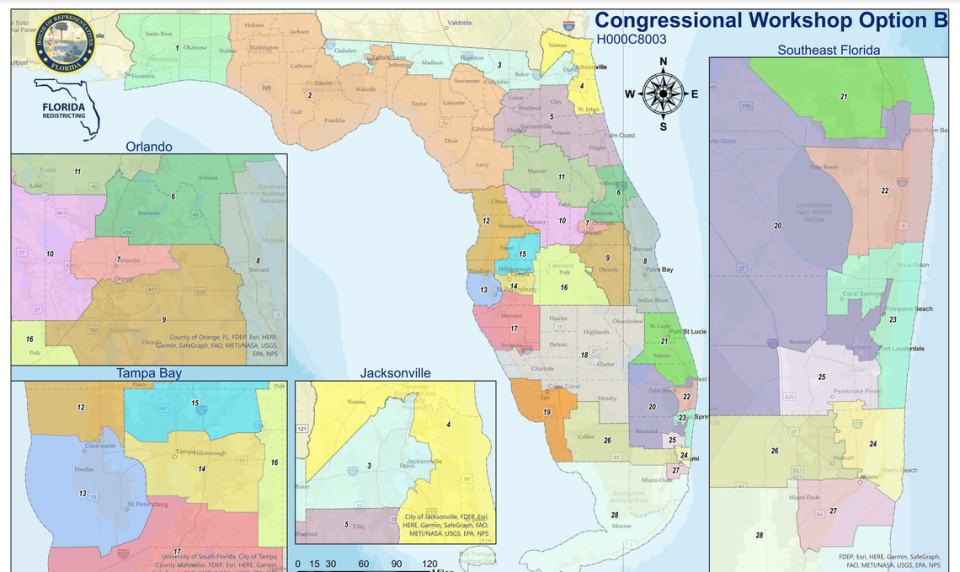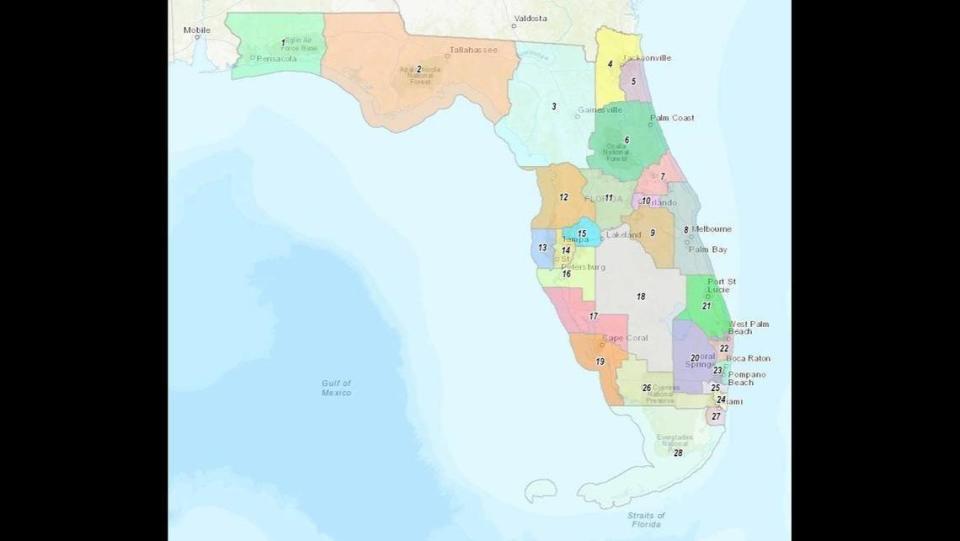Hearing casts more doubt on DeSantis’ congressional map. Now judge weighs decision
A Florida judge signaled skepticism Thursday that he could uphold Gov. Ron DeSantis’ congressional districts after Florida’s lawyers admitted the districts violate the state Constitution.
Lawyers for the governor and the GOP-controlled Legislature conceded that their congressional map reduced Black voting power, but they argued that the alternative — a Jacksonville-to-Gadsden County district that protects Black voters’ electoral influence — would violate the U.S. Constitution.
Second Judicial Circuit Judge J. Lee Marsh, a Rick Scott appointee, repeatedly pressed the state’s lawyers on whether they were asking him to contradict past precedent and decide on his own that the Florida Supreme Court’s previous decisions were invalid.
READ MORE: Deal reached in redistricting lawsuit. Outcome is a gamble for DeSantis and Democrats
Marsh didn’t yet rule on the map, but he said he would give the order his undivided attention next Thursday and Friday.
“If you’re laying a record for the Florida Supreme Court to throw out its own ruling, you can do that,” Marsh told the governor’s lawyers. “You’re saying the Florida Supreme Court violated the U.S. Constitution in what it did [last decade]. I’m not going there. I don’t think I have the power to say, ‘You know what, the Florida Supreme Court got it wrong, but that’s their business or the U.S. Supreme Court’s to do.’ ”
Which constitution takes precedent?
The state raised a major question as its defense to the lawsuit: whether the Florida Constitution’s protections for Black voters violate the U.S. Constitution’s Equal Protection Clause in the 14th Amendment.
The lawsuit was brought by voting-rights organizations, Black Voters Matter Capacity Building Institute,Florida Rising, and the League of Women Voters of Florida, along with individual voters.
A decade ago, Florida voters approved the Fair Districts amendments, incorporating federal Voting Rights Act language into the state Constitution. That protection prohibited the state from eliminating districts where voters from a minority group could elect candidates of their choice.

Jacksonville’s Black voters had a district drawn to protect their ability to elect their preferred candidates from 1992 until 2020.
Last decade, the Florida Supreme Court found that the Republican-led Legislature drew a map that violated Florida’s anti-gerrymandering provisions.
The court ordered a district that stretched from Jacksonville to Gadsden County. But DeSantis and his staff replaced it with whiter, more Republican ones across North Florida. Last year’s election marked the first time in three decades that Black voters in North Florida failed to elect a congressional representative of their choice.
Why isn’t attorney general defending state Constitution?
The lawyers’ arguments have revolved around constitutional complexities, and the judge questioned why no one from the state was defending the voter-approved protections. “Why isn’t the attorney general here defending the constitutionality of the Florida Constitution?” asked Marsh, a former chief assistant attorney general.
The state’s lawyers countered that it was the plaintiffs’ burden to defend the language and asked Marsh to rule a hypothetical district as unlawful racial gerrymandering. They also insisted that the only way to protect Black voters’ ability to elect candidates was through a specific Jacksonville-to-Tallahassee configuration.
However, the plaintiffs’ attorney, Abha Khanna, pointed out that the Legislature passed a map including a compact Duval-only district, later vetoed by DeSantis.

Marsh suggested he could just strike down DeSantis’ map and leave it up to the Legislature to decide how it will draw a new map that complies with both the Florida and U.S. constitutions.
“The remedy is, ‘You can’t use this map,’ ” Marsh said. “Why isn’t that available?”
The state’s lawyers said even though they admit the state violated the law, the plaintiffs had to prove a hypothetical remedial map wouldn’t violate the U.S. Constitution.
The case has revealed sharp divisions and raised thorny legal issues. Marsh expressed concerns about a canceled two-week trial, noting that he would have liked a more established record because the case will likely be appealed to the Florida Supreme Court.
Should Marsh strike down the map, both parties previously agreed to accept a previously ordered east-to-west district as a remedy during the appeal. However, the judge noted that it would still be the Legislature’s responsibility to craft a solution.
The ruling, when it arrives, could have far-reaching implications for Florida’s political landscape and set a significant precedent in the ongoing national debate over redistricting and voting rights.
Contact Andrew Pantazi of the Tributary at Andrew.Pantazi@jaxtrib.org.
This story is published in partnership with The Tributary, a Florida-based nonprofit newsroom.


